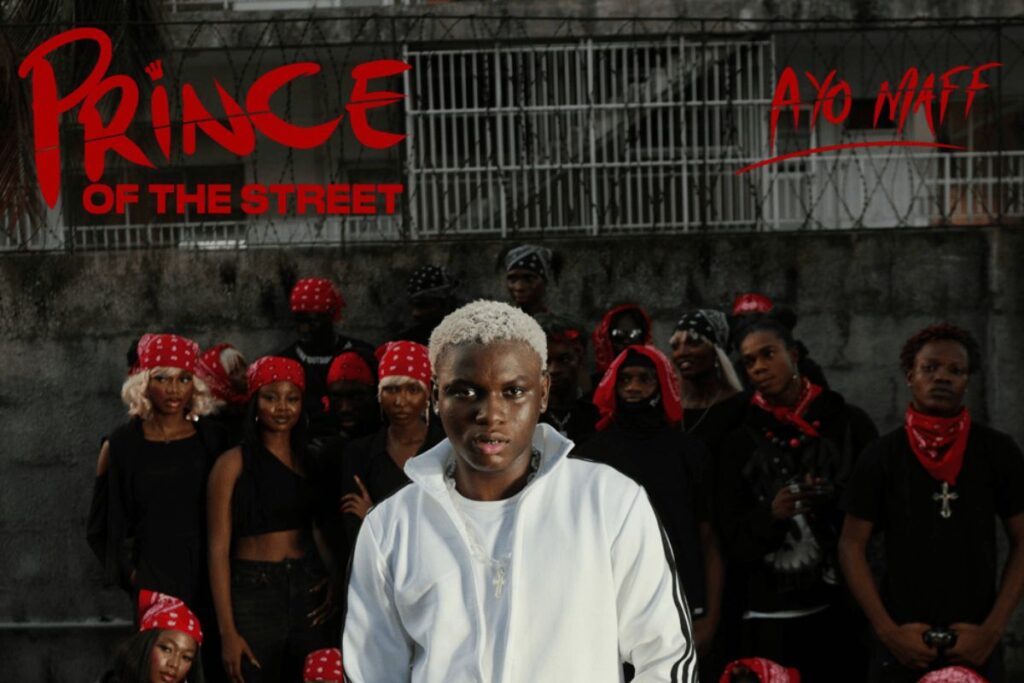For some, Ayo Maff‘s music can be a little too much. His sombre melodies and tales of pain dampen rather than lift the spirit. However, these are not the people for whom he makes music. He has no intentions of subsisting his reality for the joy and merriment some listeners crave. Not when he and his community have not known joy for most of their lives.
The fast-rising star is the voice of the street, and he makes this clear on his debut LP ‘Prince of the Street’ where he doubles down on the common anguish that shapes his reality while sharing a teenage take on the complications of modern love and relationships.
Ayo Maff, referring to himself as the prince of the street,t acknowledges his position as the voice of the people and recognizes the king who paved the way for him.
Like a prince, he speaks for his people and declares his ambitions while also paying homage to the king.
His decision to sample influencer and social commentator Naijashimadun‘s criticism of the presence of overwhelming sorrow in his music is a bold declaration of his stance to maintain the poignancy that shapes his music.
It’s this pain that shapes the album, which mostly feels like a playlist or maybe a lengthy track about struggle, love, and ambition. Maintaining his blend of Pidgin and Yoruba with drawn-out emotive mid-tempo melodies, Ayo Maff gives the album a core that also limits its diversity.
He ensures that his pain, whether socioeconomic or romantic, is palpably felt by listeners whom he brings into his headspace through moving melodies and honest lyrics.
On ‘Realness’, he combines with award-winning vocalist Chike to demand authenticity when love his shaped by pretence and highly guarded emotions.
He pours out his heart to a lover on ‘Felony’ while sharing his inability to offer the finest thing, as a time when material things shape romantic relationships. This honesty is a lived reality of the singer who speaks on the economics of modern love that has become a hot topic.
He shares his romantic hopelessness on the captivating ‘Panic’, where he admits to suffering bouts of anxiety from longing.
On ‘Baddo’s Song’, he samples Nigerian hip hop legend Olamide Baddo’s classic ‘Yemi My Lover’ for a 3 Step Afro House declaration of love next to Jazzworx and Thukuthela. At the risk of being pedantic, this writer thinks Baddo’s street anthem ‘Voice of the Street’ would have been the appropriate track through which to pay homage to the icon.
Like a young man who maintains a high level of self-awareness, he prioritises honesty over fakeness. On ‘9 Days’, he admits to his mortality in a world shaped by the rat race for success. He paints a vivid picture of the fickleness of life by sharing the tale of losing a loved one the same day he made his first 1 million naira.
Ayo Maff’s album gives a subtle yet frightening insight into the desire for success by a young generation who are willing to go the extra mile.
He admitted to diving into vices like other street hop stars and young men across the country. He also admits to practices of “bathing soap” on ‘9 Days’ and ‘Igbalode’.
While such matters as soap bathing used to be the stuff of Nigerian home videos, where it used to caution viewers on the dangers of engaging in such practices in return for success, it’s now a recurring sight on social media where young men and even teenagers flaunt the labour that preceded the flashy lifestyle.
Ayo Maff speaks for the people on ‘Prince of the Street’ [Review] Read More



